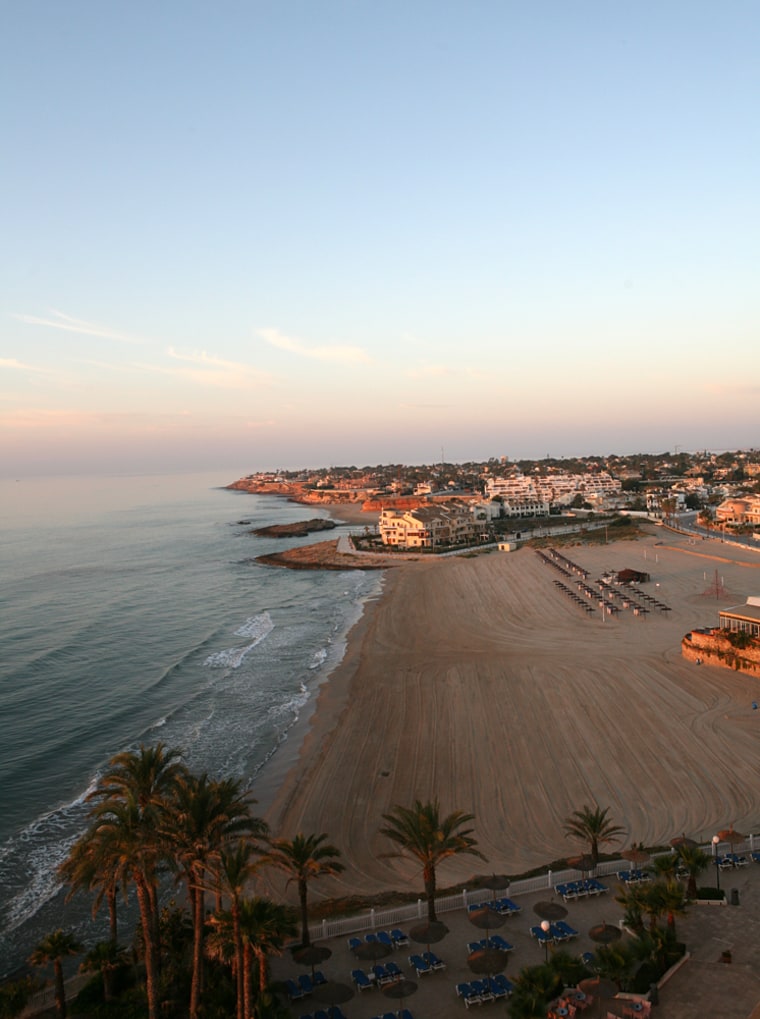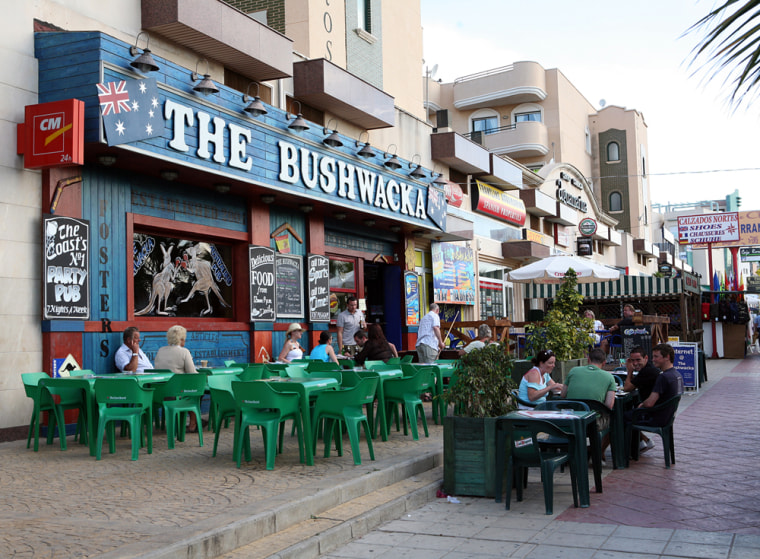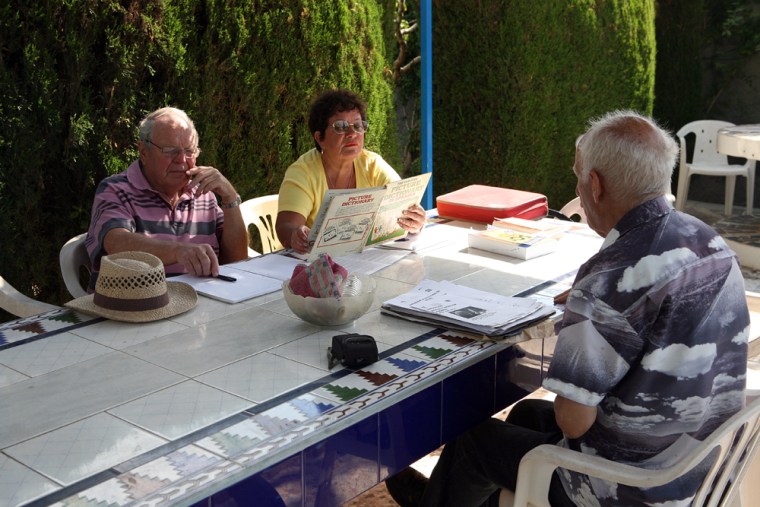Sunlight was the main reason Gill Burden left Britain to retire in Spain.
“I always intended to come here because of the weather,” the 68-year-old says in her house in San Miguel de Salinas, a town on the southeastern coast. “I like being able to get up in the morning and the sun is shining, and to go out and not have to wear a coat.”
So about three years ago Burden and her partner of ten years, Michael Trump, 73, packed their belongings, sold their homes in Bristol, England, and moved to Spain’s Costa Blanca in search of a comfortable but affordable retirement.
Burden’s own love of sun is obvious – her skin is tanned dark brown, something she tends to accentuate by wearing clothes the color of ripe lemons. That the two former members of the Royal Navy are house-proud is also clear — their orderly home is full of mementos from their travels, such as a Turkish prayer rug and old snapshots of them with friends. Carefully tended trees and flowers sprout and wind up the walls of their tiled garden.
What is not obvious from Burden’s sunny exterior and Trump’s toothy smile is how the global economic meltdown has conspired with issues related to growing old, pushing the couple to the financial tipping point.
“I have now gotten to the position where I don’t make plans,” Burden says. “I never know what’s around the corner — I just live from day to day.”
The plight of retirees like Burden and Trump underscores the global nature of the current economic contagion, with expatriates in the open-bordered European Union squeezed between fluctuating currencies, the collapse of national housing markets and the dissipation of the dreams of millions who thought that financial security during their Golden Years was possible.
Incomes fallen by 30 percent
In the decade or so until 2008, when Britain’s economy roared and the pound and U.K. housing prices soared, thousands of Britons fled their country’s gray skies for the sunnier climes of Europe’s Mediterranean. More than 350,000 now live permanently in Spain, about 135,000 reside in France, and tens of thousands in Greece, Cyprus and elsewhere, according to statistics from the EU and the British government.
But since the boom times came screeching to a halt last year, the pound’s depreciation against the Euro — the currency used in Spain and most of Europe — has sliced about a quarter off the income from U.K.-based pensions, retirement and savings accounts.
“This means people paid in sterling, such as pensioners, have seen their income fall by 30 percent,” says Barry Davis, a financial adviser at Spectrum IFA Group, which caters to English-speakers in Europe.
To add insult to injury, “interest rates have fallen to near zero, which has decimated the income from their savings in their bank accounts,” he adds.

Spain’s property market has worsened people’s woes. After years of being fed by easy credit and high demand, the real estate bubble burst with a mighty bang in 2007. Prices are expected to slump by 10 percent this year, after falling about 30 percent from their peak, Spanish bank BBVA says.
Meanwhile, rampant building around towns and cities and along Spain’s coasts — the sort of area where Burden and Trump live — have left about 1.2 million unsold new homes, according to the bank.
The worsening economy has left many British expatriates in dire straits and in need of help, says Tony Aldous of the Spanish branch of U.K. charity Age Concern.
“The cost of living in Spain is increasing dramatically and Age Concern has seen a doubling in the number of referrals since June last year,” he says.
Meanwhile, the U.K. government has set up workshops in communities throughout the country to help people navigate the changing times.
Britons in Spain aren’t the only ones facing problems — about a million U.K. retirees have chosen to settle abroad when counted by those who receive state pensions. That is close to 10 percent of the total, with hundreds of thousands living in countries like Australia, the United States, France and Italy, according to the British Department of Work and Pensions.

David David Cornthwaite, the chairman of the United Kingdom Citizens Association in Paphos, Cyprus, another haven for British expatriates, has also seen the effects of the economic downturn on retirees in his community.
“Some Brits are trapped because they sold up (in Britain), bought out here, and now can’t sell,” says Cornthwaite. “And the money they are bringing over in pensions is drastically reduced,” he adds, saying that the average U.K. pension income alone has gone down by around 30 percent thanks to currency fluctuations.
“We have people in the club who have started to go back to the U.K. now – people are doing the maths and are having to make a choice.”
Personal perfect storm
Back in Spain, Craig Clements, 38, who runs an Internet café and shop selling everything from local wine to refrigerator magnets in the British-dominated foreign enclave of Torrevieja says he’s seen the downturn’s impact.
“The people most affected are the people who are retired and are having to bring their money over from Britain,” he says. “They are struggling to make ends meet,” he says.
While Burden and Trump planned their move to Spain carefully, they have recently been forced to change their habits and now keep a careful eye on what they buy at the grocery store, have put-off fixing or replacing their car, and visit family and friends in Britain infrequently.
These extra-frugal habits came about after life handed the couple two bits of bad luck soon after arriving three years ago. First, they lost their 60,000-pound-deposit (equal to about $110,000 at the time) when their builder declared bankruptcy before finishing a house with a view of the mountains that they had hoped to move into.
And when things seemed like they could hardly get worse, Trump was diagnosed with dementia, after they moved into their current home, which means he may be forced to return to Britain to get treatment.
In order to move to Britain again, Burden and Trump would have to do to sell their home in Spain — a house they went into debt to buy and one that is now close to impossible to sell in the current market.
Burden says she knows many fellow expatriates who, faced with issues like theirs, have dropped everything and returned to Britain.
“I’d say probably 25 percent are going back and some of them are not bothering to sell their house, they’re just giving the keys to the banks,” she says. “They just can’t afford to be here.”
This is not an option for her, though.
“We own this house and nobody wants to buy houses now,” she says. “And we don’t have a place to live in the U.K.”
‘No-one I can go back to’
Trump and Burden would likely have coped with the worst global economic downturn since the 1930s, the financial hiccup brought on by their builder’s bankruptcy or the effects of aging, but all three at the same time have driven them to the edge.
Their future hangs on an upcoming appointment with a specialist who will tell them if Trump’s dementia can be treated in Spain or if he will have to return to Britain, which would dash the dreams of them both.
So the two tough, self-sufficient people, who did everything “right” feel like they have been thrown to the wolves. One option is that Trump move in with one of his sons, a prospect he does not relish, not only because it would mean living separately from Burden.
“I think they have their own lives, they don’t want my interfering with it,” he says.
Burden, on the other hand, never had children and has no familial safety net.
“If Michael goes back, I will have to sell this place because he will have to have some money to see him into a home,” she says. “But I have no one I can go back to, there is no one who can help me, except perhaps an ex-servicemen’s organization. I could maybe go into one of their homes.”
She pauses before gesturing at a glassed-in patio that looks onto a small swimming pool.
“But this is my home, this is my house.”
